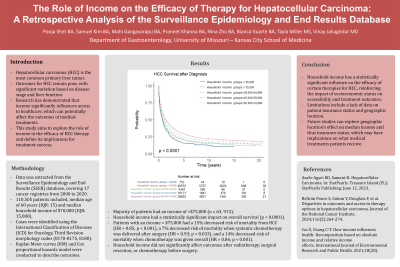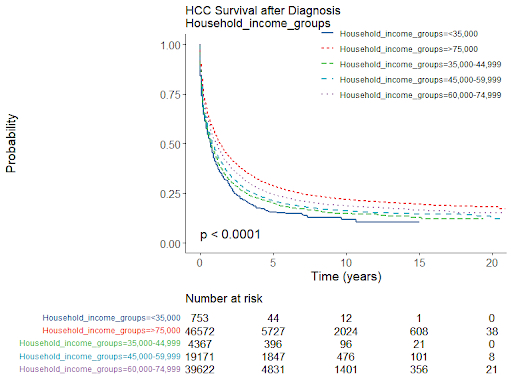Sunday Poster Session
Category: Liver
P1256 - The Role of Income on the Efficacy of Therapy for Hepatocellular Carcinoma: A Retrospective Analysis of the Surveillance Epidemiology and End Results Database
Sunday, October 27, 2024
3:30 PM - 7:00 PM ET
Location: Exhibit Hall E

Has Audio
- PS
Pooja A. Shet, BA
University of Missouri - Kansas City School of Medicine
Kansas City, MO
Presenting Author(s)
Pooja Shet, BA, Samuel Kim, BA, Mahi Gangavarapu, BA, Praneet Khanna, BA, Nina Zhu, BA, Bianca Ituarte, BA, Tayla Miller, MS, Vinay Jahagirdar, MD
University of Missouri - Kansas City School of Medicine, Kansas City, MO
Introduction: Hepatocellular carcinoma (HCC) is the most common primary tumor of the liver, with etiology primarily attributed to hepatitis B virus, hepatitis C virus, alcoholic liver disease, and non-alcoholic fatty liver disease. Despite advancements in treatment options such as surgical resection, liver transplantation, tumor ablation, transarterial therapies, and systemic chemotherapy, outcomes for HCC remain poor, with significant variation based on disease stage and liver function. Research has demonstrated that income significantly influences access to healthcare, which can potentially affect the outcomes of medical treatments. This study aims to explore the role of income in the efficacy of HCC therapy and define its implications for treatment success.
Methods: Demographic and clinical data of patients with microscopically confirmed HCC were extracted from the Surveillance Epidemiology and End Results (SEER) database, covering 17 cancer registries from 2000 to 2020. Cases were identified using the International Classification of Diseases (ICD) for Oncology, Third Revision morphology codes (8170-8175, 8180). Kaplan Meier curves (KM) and Cox proportional hazards model were conducted to describe survival outcomes.
Results: A total of 110,505 patients were included in this study, with a median age of 60 years (IQR: 15) and a median household income of $70,000 (IQR: 15,000). Based on the dichotomized description, the majority of patients had an income of < $75,000 (n = 63,913). Household income had a statistically significant impact on overall survival (p < 0.0001). Patients with an income >$75,000 had a 15% decreased risk of mortality from HCC (HR = 0.85; p < 0.001), a 7% decreased risk of mortality when systemic chemotherapy was delivered after surgery (HR = 0.93; p = 0.033), and a 14% decreased risk of mortality when chemotherapy was given overall (HR = 0.86; p < 0.001). Household income did not significantly affect outcomes after radiotherapy, surgical resection, or chemotherapy before surgery.
Discussion: This investigation found that household income has a statistically significant influence on the efficacy of certain therapies for HCC, reinforcing the impact of socioeconomic status on accessibility and treatment outcomes. This study’s limitations include a lack of data on patient insurance status and geographic location. Future studies can explore geographic location’s effect on median income and thus insurance status, which may have implications on what medical treatments patients receive.

Disclosures:
Pooja Shet, BA, Samuel Kim, BA, Mahi Gangavarapu, BA, Praneet Khanna, BA, Nina Zhu, BA, Bianca Ituarte, BA, Tayla Miller, MS, Vinay Jahagirdar, MD. P1256 - The Role of Income on the Efficacy of Therapy for Hepatocellular Carcinoma: A Retrospective Analysis of the Surveillance Epidemiology and End Results Database, ACG 2024 Annual Scientific Meeting Abstracts. Philadelphia, PA: American College of Gastroenterology.
University of Missouri - Kansas City School of Medicine, Kansas City, MO
Introduction: Hepatocellular carcinoma (HCC) is the most common primary tumor of the liver, with etiology primarily attributed to hepatitis B virus, hepatitis C virus, alcoholic liver disease, and non-alcoholic fatty liver disease. Despite advancements in treatment options such as surgical resection, liver transplantation, tumor ablation, transarterial therapies, and systemic chemotherapy, outcomes for HCC remain poor, with significant variation based on disease stage and liver function. Research has demonstrated that income significantly influences access to healthcare, which can potentially affect the outcomes of medical treatments. This study aims to explore the role of income in the efficacy of HCC therapy and define its implications for treatment success.
Methods: Demographic and clinical data of patients with microscopically confirmed HCC were extracted from the Surveillance Epidemiology and End Results (SEER) database, covering 17 cancer registries from 2000 to 2020. Cases were identified using the International Classification of Diseases (ICD) for Oncology, Third Revision morphology codes (8170-8175, 8180). Kaplan Meier curves (KM) and Cox proportional hazards model were conducted to describe survival outcomes.
Results: A total of 110,505 patients were included in this study, with a median age of 60 years (IQR: 15) and a median household income of $70,000 (IQR: 15,000). Based on the dichotomized description, the majority of patients had an income of < $75,000 (n = 63,913). Household income had a statistically significant impact on overall survival (p < 0.0001). Patients with an income >$75,000 had a 15% decreased risk of mortality from HCC (HR = 0.85; p < 0.001), a 7% decreased risk of mortality when systemic chemotherapy was delivered after surgery (HR = 0.93; p = 0.033), and a 14% decreased risk of mortality when chemotherapy was given overall (HR = 0.86; p < 0.001). Household income did not significantly affect outcomes after radiotherapy, surgical resection, or chemotherapy before surgery.
Discussion: This investigation found that household income has a statistically significant influence on the efficacy of certain therapies for HCC, reinforcing the impact of socioeconomic status on accessibility and treatment outcomes. This study’s limitations include a lack of data on patient insurance status and geographic location. Future studies can explore geographic location’s effect on median income and thus insurance status, which may have implications on what medical treatments patients receive.

Figure: Time in Years of Survival After HCC Diagnosis by Income Group.
This Kaplan-Meier survival curve demonstrates the probability of survival following a hepatocellular carcinoma (HCC) diagnosis, stratified by income group. Patients with a household income greater than $75,000 exhibit the highest probability of survival over time, indicating a significant impact of socioeconomic status on HCC outcomes.
This Kaplan-Meier survival curve demonstrates the probability of survival following a hepatocellular carcinoma (HCC) diagnosis, stratified by income group. Patients with a household income greater than $75,000 exhibit the highest probability of survival over time, indicating a significant impact of socioeconomic status on HCC outcomes.
Disclosures:
Pooja Shet indicated no relevant financial relationships.
Samuel Kim indicated no relevant financial relationships.
Mahi Gangavarapu indicated no relevant financial relationships.
Praneet Khanna indicated no relevant financial relationships.
Nina Zhu indicated no relevant financial relationships.
Bianca Ituarte indicated no relevant financial relationships.
Tayla Miller indicated no relevant financial relationships.
Vinay Jahagirdar indicated no relevant financial relationships.
Pooja Shet, BA, Samuel Kim, BA, Mahi Gangavarapu, BA, Praneet Khanna, BA, Nina Zhu, BA, Bianca Ituarte, BA, Tayla Miller, MS, Vinay Jahagirdar, MD. P1256 - The Role of Income on the Efficacy of Therapy for Hepatocellular Carcinoma: A Retrospective Analysis of the Surveillance Epidemiology and End Results Database, ACG 2024 Annual Scientific Meeting Abstracts. Philadelphia, PA: American College of Gastroenterology.
